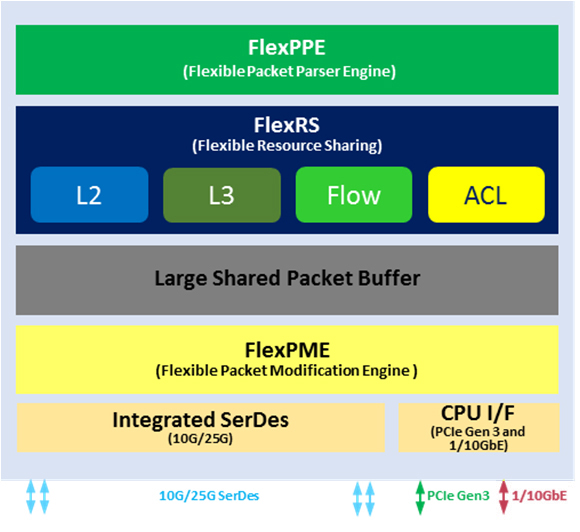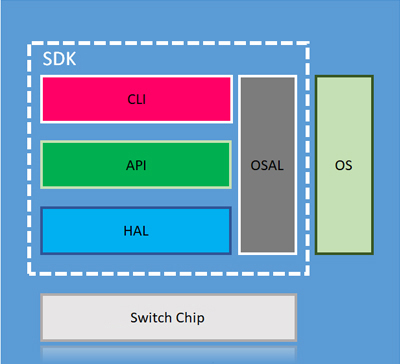PRODUCTS
EOL Aurora 705 - Intel Xeon D-1527 CPU
- ONIE Pre-loaded
- Nephos Taurus NP8367
- 32 ✕ 100G
- ONL ready






The Aurora 705 series is suited for Top-of-Rack/Spine Datacenter, Enterprise, and Cloud Service Provider network deployments with its wire speed L2/L3 switching and consistently low latency.
32x100GbE ports are backed by Nephos Taurus ASIC, each supporting 1 x 100 GbE or 1x 40 GbE or via breakout cables 4 x 25 GbE or 4 x 10 GbE.
The switch is loaded with ONIE installation environment for disaggregated networking, supporting an easy installation of any compatible NOS at any scale.
For the development purpose, the Aurora 705 offers a feature-rich SDK with:
- Extensibility
- Hardware Abstraction Layer across multiple chips
- Portability
- OS-independent: OS Abstraction Layer
- Endian agnostic
- 64-bit-addressing
- Easy to Debug
- APIs to trouble-shoot SDK problems
- APIs for chip diagnostic
Programmability
- Wire-speed programmable deep packet classification, flexible and recursive match/result-actions, packet generation/modification, fungible match and result memory including real-time instrumentation, packet diagnostics, and state updates
- Advanced L2-L5 programmable entropy with micro and jumbo flow-steering for better fabric utilization
- Larger Service Scale: >800K IP addresses, >70K ACLs, push > 10 labels (MPLS or user-defined)
- Granular Fungible Memories for all Tables and database result Memories (Flexible Shared Data structures for Forwarding, QoS, Instrumentation, and Security)
Leaf-Spine architecture
- Aurora 705 is great for Spine tier, you can achieve a number of advantages over traditional Core/Aggregation/Access approach:
- Two-tier fabric with near-optimal subscription ratio
- Easy scale to hundreds of nodes
- Energy Efficient
- Low latency
Performance
- 32x 100/50/40GbE QSFP28 ports in 1 RU
Up to 128x 25/10G SFP28 port via break-out cables - 3.2Tbps Nephos Taurus NP8367
- 28MB packet buffer size
- Intel® Xeon® Processor D-1527 quad core processor for application deployment
- Up to 16GB of DDR4 memory (8GB default)
Reliable hardware platform
- Redundant 1200W 1+1 power supplies
- Redundant N+1 cooling
Network OS (NOS) options
- Open Network Linux is a Linux distribution for "bare metal" switches, that is, network forwarding devices built from commodity components. ONL uses ONIE to install onto on-board flash memory. Open Network Linux is a part of the Open Compute Project and is a component in a growing collection of open source and commercial projects.
- Microsoft SONiC - a collection of networking software components required to have a fully functional L3 device. It is designed to meet the requirements of a cloud data center. It is fully open-sourced at OCP.
Specification
| Ports | 32x 100/50/40GbE QSFP28 ports in 1 RU Up to 128x 25/10G SFP28 ports via break-out cables 1x RJ-45 out-of-band (10/100/1000) management 1x RJ-45 console (RS232) 1x USB |
| Front IO | Fan LED System status LED PSU1 status LED PSU2 status LED Reset button Service tag |
| Performance | Switching silicon: 3.2Tbps Nephos Taurus NP8367 Larger Service Scale: >800K IP addresses, >70K ACLs, push > 10 labels (MPLS or user defined) Wire-speed programmable parsing with FlexPPE architecture Packet Buffer: 28MB Intel® Xeon™ Processor D-1527 8GB DDR4 ECC (up to 16GB) 128GB SSD |
| Power | 550W 1+1 RPSU 80+ Platinum: 100V~240V AC / 50~60Hz 240V DC Typical/Max power draw: 350/415W Watts (with optics) |
| Cooling | 4 N+1 redundant fans Front-to-Back/Back-to-Front airflow |
| Dimensions (DxWxH) | 1U, 430 x 440 x 44 mm Rackmount kit |
| Environment | Operating temperature: 0~45°C Operating humidity: 20-95% maximum relative humidity (non-condensing) |
| Warranty | 3 year |
| EMC and safety | FCC CE Declaration of Conformity Reduction of Hazardous Substances (RoHS) 6 |
| Compatible NOS | Open Network Linux Microsoft SONiC |
| SONiC | * BGP * ECMP * LAG * LLDP * QoS - ECN * QoS - RDMA * Priority Flow Control * WRED * COS * SNMP * Syslog * Sysdump * NTP * COPP * DHCP Relay Agent * SONiC to SONiC upgrade * One Image * VLAN * ACL permit/deny * IPv6 * Tunnel Decap * Mirroring * Post Speed Setting * BGP Graceful restart helper * BGP MP * Fast Reload * PFC WD * TACACS+ * MAC Aging * LACP Fallback * MTU Setting * Vlan Trunk * IPv6 ACL * BGP/Neighbor-down fib-accelerate * Port breakout * Dynamic ACL Upgrade * SWSS Unit Test Framework (best effort) * ConfigDB Framework * Critical Resource Monitoring * MAC Aging * IPv6 ACL * BGP/Neighbor-down fib-accelerate * PFC WD * gRPC * Dtel support * Sensor transceiver monitoring * LLDP extended MIB: lldpremtable, lldplocporttable, lldpremmanaddrtable, lldplocmanaddrtable, lldplocporttable, lldpLocalSystemData * Debian Kernel 4.9 * Warm Reboot * Incremental Config (IP, LAG, Port shut/unshut) * Asymmetric PFC * PFC Watermark * Routing Stack Graceful Restart * Basic VRF and L3 VXLAN * FRR as default routing stack * Everflow enhancement * Egress ACL bug fix and ACL CLI en-hancement * L3 RIF counter support * PMon Refactoring * BGP-EVPN support(type 5), (related HLD Fpmsyncd,Vxlanmgr,template) |
